Edward Snowden has set out the case for Barack Obama granting him a pardon before the US president leaves office in January, arguing that the disclosure of the scale of surveillance by US and British intelligence agencies was not only morally right but had left citizens better off.
The US whistleblower’s comments, made in an interview with the Guardian, came as supporters, including his US lawyer, stepped up a campaign for a presidential pardon. Snowden is wanted in the US, where he is accused of violating the Espionage Act and faces at least 30 years in jail.
Speaking on Monday via a video link from Moscow, where he is in exile, Snowden said any evaluation of the consequences of his leak of tens of thousands of National Security Agency and GCHQ documents in 2013 would show clearly that people had benefited.
“Yes, there are laws on the books that say one thing, but that is perhaps why the pardon power exists – for the exceptions, for the things that may seem unlawful in letters on a page but when we look at them morally, when we look at them ethically, when we look at the results, it seems these were necessary things, these were vital things,” he said.
“I think when people look at the calculations of benefit, it is clear that in the wake of 2013 the laws of our nation changed. The [US] Congress, the courts and the president all changed their policies as a result of these disclosures. At the same time there has never been any public evidence that any individual came to harm as a result.”

Although US presidents have granted some surprising pardons when leaving office, the chances of Obama doing so seem remote, even though before he entered the White House he was a constitutional lawyer who often made the case for privacy and had warned about the dangers of mass surveillance.
Obama’s former attorney general Eric Holder, however, gave an unexpected boost to the campaign for a pardon in May when he said Snowden had performed a public service.
The campaign could receive a further lift from Oliver Stone’s film, Snowden, scheduled for release in the US on Friday. Over the weekend the director said he hoped the film would help shift opinion behind the whistleblower, and added his voice to the plea for a pardon.
Ahead of general release, the film will be shown in 700 cinemas across the US on Wednesday, with plans for Stone and Snowden to join in a discussion afterwards via a video link.
In his wide-ranging interview, Snowden insisted the net public benefit of the NSA leak was clear. “If not for these disclosures, if not for these revelations, we would be worse off,” he said.
In Hong Kong in June 2013, when he had passed his documents to journalists, Snowden displayed an almost unnatural calm, as if resigned to his fate. On Monday he said that at that time he expected a “dark end” in which he was either killed or jailed in the US.
More than three years on, he appears cheerful and relaxed. He has avoided the fate of fellow whistleblower Chelsea Manning, who is in solitary confinement in the US. Snowden is free to communicate with supporters and chats online late into the night.
His 2.3 million followers on Twitter give him a huge platform to express his views. He works on tools to try to help journalists. He is not restricted to Moscow and has travelled around Russia, and his family in the US have been to visit him.
But Snowden still wants to return to the US and seems confident, in spite of all the evidence to the contrary, that it will happen. “In the fullness of time, I think I will end up back home,” he said.
“Once the officials, who felt like they had to protect the programmes, their positions, their careers, have left government and we start looking at things from a more historical perspective, it will be pretty clear that this war on whistleblowers does not serve the interests of the United States; rather it harms them.”
Snowden attracts lots of conspiracy theories. Early on, he was accused of being a spy for China and then a Russian spy. In August a cryptic tweet followed by an unusual absence prompted speculation that he was dead. He said he had simply gone on holiday.
The reports of my death are greatly exaggerated. pic.twitter.com/ZgIkapmcOC
— Edward Snowden (@Snowden) August 15, 2016
There had also been rumours that his partner, Lindsay Mills, had left him, which would have been embarrassing as their romance occupies a large part of the Stone film. Snowden said “she is with me and we are very happy”.
His revelations resulted in a global debate and modest legislative changes. More significant, perhaps, is that surveillance and the impact of technological change has seeped into popular culture, in films such as the latest Jason Bourne and television series, such as the Good Wife.
Snowden also welcomed “a renaissance of scepticism” on the part of at least some journalists when confronted by anonymous briefings by officials not backed by evidence.
He warned three years ago of the danger that one day there might be a president who abused the system. The warning failed to gain much traction, given that Obama’s presidency seemed relatively benign. But it resonates more today, in the wake of Donald Trump’s response to the Russian hacking of the Democratic party: that he wished he had the power to hack into Hillary Clinton’s emails.
If Obama, as seems likely, declines to pardon Snowden, his chances under either Clinton or Trump would seem to be even slimmer. He described the 2016 presidential race as unprecedented “in terms of the sort of authoritarian policies that are being put forward”.
“Unfortunately, many candidates in the political mainstream today, even pundits and commentators who aren’t running for office, believe we have to be able to do anything, no matter what, as long as there is some benefit to be had in doing so. But that is the logic of a police state.”
He is even less impressed by the British prime minister, referring to Theresa May as a “a sort of Darth Vader in the United Kingdom”, whose surveillance bill is “an egregious violation of human rights, that goes far further than any law proposed in the western world”.
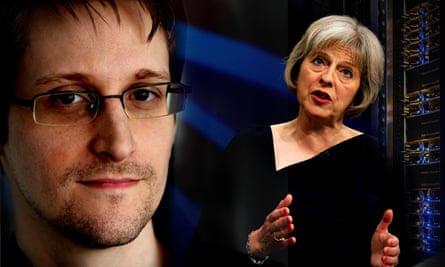
Snowden was initially berated by opponents for failing to criticise the Russian president, Vladimir Putin, but he has become increasingly vocal. It is a potentially risky move, given his application for an extension of asylum is up for renewal next year, so why do it?
“Well, it would not be the first time I have taken a risk for something I believe in,” he said. “This is a complex situation. Russia is not my area of focus. It is not my area of expertise. I don’t speak Russian in a fluent manner that I could really participate in and influence policy. But when something happens that I believe is clearly a violation of the right thing, I believe we should stand up and say something about it.
“My priority always has to be my own country rather than Russia. I would like to help reform the human rights situation in Russia but I will never be well placed to do so relative to actual Russian activists themselves.”
Might he end up as part of a US-Russian prisoner exchange, with Putin possibly more amenable to the idea if Trump was in power? “There has always been the possibility that any government could say, ‘Well, it does not really matter whether it is a violation of human rights, it does not really matter whether it is a violation of law, it will be beneficial to use this individual as a bargaining chip’. This is not exclusive to me. This happens to activists around the world every day.”
He said he saw the Stone film as a mechanism for getting people to talk about surveillance, though he felt uncomfortable with other people telling his story.
Snowden has toyed with writing his memoirs but has not made much progress. There are at least three books about him on the way; an extensively researched one by the Washington Post’s Bart Gellman and two others thought to be hostile.
Asked if he was the source for the Panama Papers – the comments by the source sound like Snowden – he laughed. He praised the biggest data leak in history, adding that he would normally be happy to cloak other whistleblowers by neither denying nor confirming he was a source. But he would make an exception in the case of the Panama Papers. “I would not claim any credit for that.”
For someone who has spent his life trying to keep out of the public eye, he has now appeared in a Hollywood movie and an Oscar-winning documentary, and several plays, including Privacy, which just ended a run in New York and in which he has a part alongside Daniel Radcliffe.
“It was an alarming experience for me. I am not an actor. I have been told I am not very good at it. But you know if I can, I can try and maybe it will help, I will give it my best shot.”
For Snowden, his campaign for a pardon, even if forlorn, offers a chance to highlight his plight, and he expressed thanks to all those who were backing it. He also said he hoped that after the fuss of the movie he could finally fade into the background. “I really hope it is over,” he said. “That would be the greatest gift anyone could give me.”
- Support the Guardian’s fearless, independent journalism by making a contribution or becoming a member.

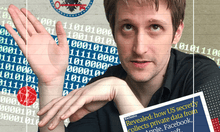

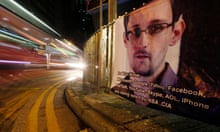


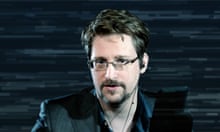
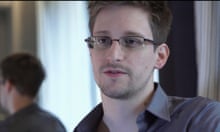
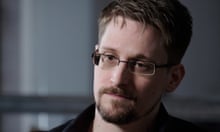

Comments (…)
Sign in or create your Guardian account to join the discussion